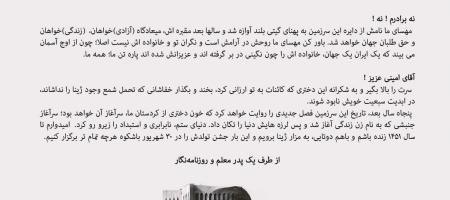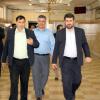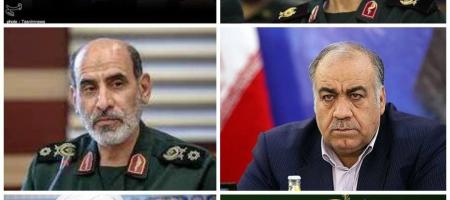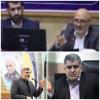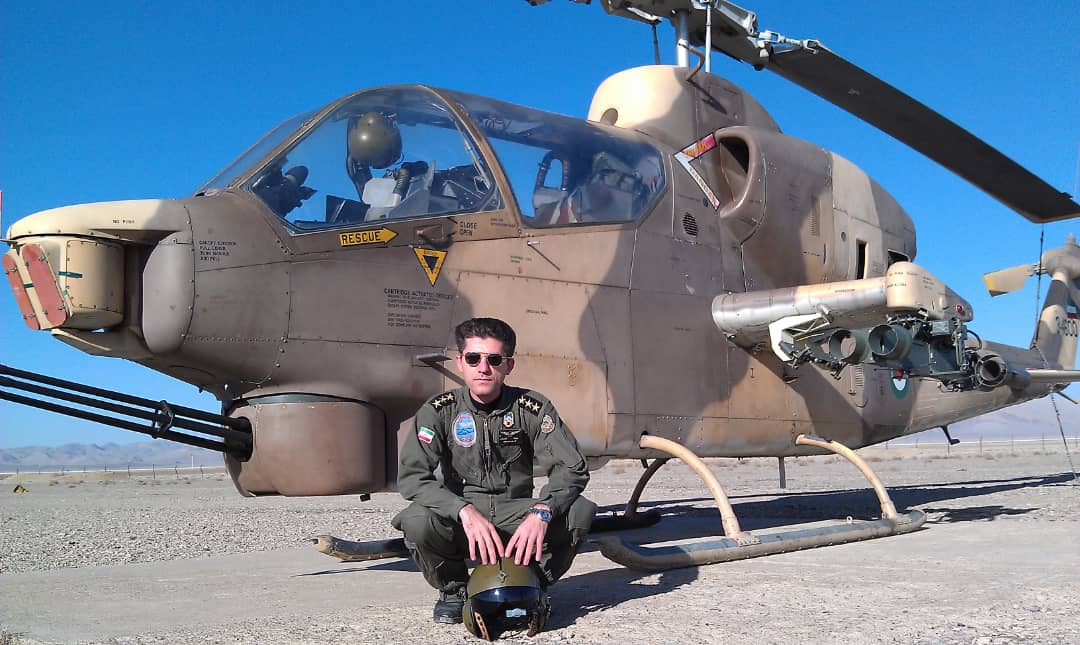
Turkish authorities have detained at least eight people, including two alleged Iranian agents, who attempted to abduct Mehrdad Abdarbashi a former Iranian pilot back to Iran.
The Iranian agents were sent to Turkey with the purpose of creating a “network” that would kidnap and smuggle the dissidents back to Iran.
Avatoday’s Ali Javanmardi has interviewed Abdarbashi, who explained in detail the Iranian agents’ operation against him.
Ali Javanmardi: Mr Mehrdad Abdarbashi we heard in the news that the Islamic Republic had sent a team to abduct you and take you back to Iran, and Turkey prevented this, arresting several people. They say up to 15 individuals have been detained, at least two of whom are Iranian citizens. Can you explain what happened?
Mehrdad Abdarbashi: Greetings to you and your audience.I was forced to leave Iran three years ago, and applied for asylum in Turkey. I faced a lot of hardship on my journey. MIT, the Turkish Intelligence Organization, helped me from the start. They met with me every month, regarding security issues. I think Iran was unaware of my whereabouts for three years, otherwise they would have attempted to kidnap me earlier. They found out where I lived just recently. They tried different ways to entrap me, but in this last attempt, which was foiled, and everybody involved got arrested, they sent a woman affiliated with Iran's intelligence agency.
Ali Javanmardi: Who was this woman? Has she been arrested? Can you explain more?
Mehrdad Abdarbashi: In my first year in Turkey, I stayed at home most of the time out of fear, disguising myself every time I went out, with a hat for example. I would go out covertly, only for short periods of time, just for shopping daily necessities. After a year, the police and intelligence agency of Turkey guaranteed that my life was not in danger. They told me that I could work and move around freely, and that they will look out for me. They told me everything was under control, and asked me not to worry. I opened a restaurant where I served Iranian food. We had lots of customers. I worked behind the scenes, managing it. We had a Turkish customer, whose wife was Iranian. We kept in touch for 2 years. He used to come and dine at my house. One of the persons who guided this operation and sold information to Iran, which I have come to know about recently, was this person, who pretended to be my friend. He was constantly travelling to Iran. Apparently he would go to Iran, and obtain photos of targets, in order to identify them. He would then befriend them, and get their contact details. He was fluent in Persian. So he easily cooperated with Iran's intelligence. He not only gave them my details, but those of others too.
Ali Javanmardi: Was he a Turkish citizen?
Mehrdad Abdarbashi: Yes, he is a Turkish citizen, but because he was an interpreter for the police and the immigration office, no one suspected him. Since he worked in public institutions giving service to asylum seekers, he wasn't suspected. Not even by Turkish Intelligence, I think. But they came to know about him, in the process of this kidnap plot. He took me in his car once under the pretext of wanting to show me some land just a few kilometres away. Before I knew it, we had travelled dozens of kilometres to a village close to Iran's borders. I asked him what we were doing there. I told him: "Do you know my situation?" "I am an asylum seeker, why have you brought me here? I warned him there, that if he did not return me to my home, Turkish intelligence would find out, and it would be bad for him, and it worked. He thought I was joking when I said that Turkish security was tracking me, but when he called his wife, she told him security had indeed called her, looking for him and me. That we had been caught on a gas station's security cameras, and that they knew we were together. We came back. And security told me I had been careless and I was lucky to have gotten away. After that they became cautious of him. This happened in late August.
Ali Javanmardi: So, did he bring you back to gain trust and prove there was no intention involved?
Mehrdad Abdarbashi: They told me that if he hadn't brought me back and if he had handed me to Iran, he would have faced multiple charges of kidnap and treason, and gotten at least 30 years in jail. Apparently they had told this to his wife, who had conveyed it to him over the phone, which led to him bringing me back. But he made light of it all, saying he was not crazy to hand me over to them (the Iranians). Now it has become apparent that he was one of the people plotting with Iranian intelligence to take asylum seekers back to Iran. This first attempt was unsuccessful. I was lucky, I warned him that police and security would be looking for me, and it worked. But he said he didn't mean anything by it, and that it was just a pleasure ride. But he came under suspicion by Turkish intelligence after that, and his phone was tapped. They told me this later. Saying they had him under surveillance, and obtained lots of intelligence through him. So, Iran's intelligence failed in this first attempt.
Ali Javanmardi: What was their second attempt?
Mehrdad Abdarbashi: I made a living through Forex. My restaurant got closed because of COVID. I had that just for 4 months. After that I worked online on Forex. I used to teach it as well. A woman, under the pretext of wanting to learn, saying she had seen my videos and instructions, got in touch with me. I gave the details of anyone who contacted me to Turkish intelligence. They worked really well. I told them that she was in contact with me, that she was an Iranian resident in Turkey. I told them the reason for which she had made contact with me. They put her under surveillance too, and found out she was sent to entrap me. They even allowed me to listen to the conversations she had with Iranian intelligence.
Ali Javanmardi: Can you give us her name? Has she been arrested?
Mehrdad Abdarbashi: Yes she has been arrested. But I am not allowed to reveal her name. However, they have mentioned her initials in Turkish media. It is ME.
Ali Javanmardi: Can you tell us what she did?
Mehrdad Abdarbashi: For the first two weeks everything was very normal. She came to learn. But her activities were suspicious. She sent suspicious texts and acted dubiously. And the Turkish police said they were keeping an eye on her. The intelligence was keeping an eye on her. On the last session we had, the 24th of September, she invited me for dinner. She had apparently met with Iranian intelligence in a café, and obtained knock-out drugs, and instructions on how to use them. She had been told to call a specific taxi, which they would arrange to be close by, once I was unconscious. She was told the taxi driver, accompanied by an intelligence agent, would come to the apartment and take me, as if I was an unconscious patient needing to be transferred to the hospital. They had tapes and plastic ropes in their car to tie me down and kidnap me, they (the police) showed me. When the cab came close to the location, they were arrested, before dinner was served. You saw the footage. They arrested the occupants of the taxi, and agents came to the apartment and arrested her as well. They arrested them all. The media says they were 8. But they were approximately 15. This woman, and two agents, were Iranians. Apparently the agent who had given the knock-out drugs had left for Istanbul on another mission, the woman had been informed. So he was replaced by another, who accompanied the taxi driver. But the guy in Istanbul has also been arrested. So, 3 Iranians have been arrested in connection with this plot, and 12 Turks.
Ali Javanmardi: Can you tell us a bit about yourself now, for our audience to know who you are and why it was important for the Islamic Republic to have you returned?
Mehrdad Abdabashi: I am Mehrdad Abdarbashi. I was a pilot in the Islamic Republic of Iran's army. I wanted to be a pilot since childhood, and since my family was in the military, and I was brought up in an environment surrounded by pilots, I was interested in becoming a pilot from early on. I was an excited youth, unaware of what was happening behind the scenes, I just saw it as becoming a pilot, but when I got into it, as I progressed and obtained higher ranks, and my work became more sensitive, I became aware of the corruption that existed, the organized corruption in the army and armed forces, the theft and looting that occurred, the immorality. I saw all that, and I handed in my resignation on several occasions. I even asked the army's intelligence protection organization to fire me. They told me there was no way out. They said Khamenei had ordered no pilot or doctors to leave the army or armed forces, they were not allowed to resign. For example, I asked them if I would get fired for being disrespectful to the flag in the morning assembly. They said no. You would be dealt with by the security agency. You would go to jail. I told them to show me a way out, that I didn't want to stay, I didn't want to serve in this system. Although I was careful how I said it. I could not openly say to them that they were terrorists, that they exported terrorism to the world, that even the army had become their pawn, and had become involved in their terrorism. This I say because the army's commanders are all members of the IRGC. They are all faithful to the IRGC.
Ali Javanmardi: When we speak of the Iranian army, we mean people like you, freedom seekers, who are not few, many are like you. We are in touch with them and know that they are dissidents. When we talk about the army, we mean them, not the heads of the army, who we know are all corrupt and members of the IRGC.
Mehrdad Abdarbashi: Yes, and the (corrupt) ones I speak about are the heads, the ones at the top. I mean corruption of the people in charge of the bases. The heads of the army's intelligence protection organization and its political ideology organization, the headquarters' heads, commanders, deputy commanders, and commanders of the companies. These were the people who were practically committing theft, and nobody could say anything. For example, at the base, an innocent sergeant, who painted and in the process inhaled paint and got it into his lungs, was supposed to be given 3 million tomans, but the heads divided this money among themselves, and only gave him 50 thousand tomans. They would cheat the sergeant, who got a monthly salary of only 1.1 million tomans. Or if I went on a mission, and got handed an award, a gift, to be distributed among the mission team, the heads would claim that and divide it between themselves. They would steal anyway they could. The last post they gave me was deputy of the Service Battalion, it was an important position. The work involved signing important financial documents. I saw all the corruption that went on there. For instance, I saw how the commander of the base would falsely claim overtime for himself. Even though I was there more than him, I would get paid less. He would claim 3 million tomans for his overtime work, at the time when the salary of sergeants was only 1 million tomans, three years ago when I served there. There was a lot of corruption, and not just financial ones. Organized corruption. Crimes committed in corporate housing.
Ali Javanmardi: Can you tell us more about these corruptions?
Mehrdad Abdarbashi: For instance, an officer would have gone on a long mission somewhere far. Head of the political ideology organization would have a relationship with his wife, he would tempt her with money and rape her. This kind of corruption existed. I myself wrote to them many times. For example, the heads of the base would have a park for themselves, have a playground for their own children. I wrote to them, asking them why they didn't put one in the park of the other soldiers, where the community was bigger. But they would try to silence us. They would say "you have no right to object, it does not concern you". What I mean to say is that these kinds of corruption, and sexual assaults on people's families, and then financial corruption at higher levels, all of these existed. Another example would be when a head would try and bring a nameless martyr to be buried in the corporate housing area so that he would be promoted to a commander. Whatever I say about the corruption that goes on is still not enough, and there is no end to it. But I became aware of all the corruption that practically goes on there when I was given this post. I would attend the committees organized for commanders and would see for example how someone was not even able to read the Quran, but pretended to be very religious with a mark on his forehead, a sign of constant worship, which he used to gain promotion and higher ranks, pretending to be religious to deceive. I would always complain. They knew me, and were afraid because I was always objecting to the corruption that went on there, writing letters, and all. So in the last few years, I tried not to serve this terrorist regime. My file is full of absences, 14-day absences. I used to serve for one day, and be absent for 14 days. One day on, 14 days off. I wanted them to fire me. But unfortunately, they would not let me go. And then they asked me to go to Syria. During those years when the IRGC suffered many casualties in Syria, in 2016 and 2017, when Israel heavily bombed them. They used to bring the bodies of the victims to be buried in secret in Iran. They said they were suffering many losses, and it was the army's turn. Qasem Soleimani would come and offer justification for recruiting officers. They formed lots of companies to be sent to Syria, and easily made high ranking commanders in charge of them. Pilates, who were the nation's investments, would easily be sent to command a company in Syria. I remember in 2000-2003, when I was a student, they told us, every litre of petrol spent on you, each hour that you fly, costs 50 million tomans for the country. Then, this kind of investment would be sent off to Syria to get easily killed.
Ali Javanmardi: Many who are hearing you are undoubtedly in the military, since we will be posting this interview on our military channel as well. What message do you have for those who see you, who hear your voice? I think by now they have become aware of why the Islamic Republic was willing to spend $100,000, have 15 of its operatives arrested and cancelled, to have you brought back. To set you as an example for others who think like you, who oppose corruption, who are against the ruling clerics, who are patriots and freedom seekers. They don't want them to be tempted to leave the country or break free of the regime. What message do you have for them? What would you like to say to them?
Mehrdad Abdarbashi: I was able to save my life with great difficulty. The journey I had to take to reach a safe place, to seek asylum here, was a difficult one. I faced a lot of adversity on this journey. I am not in a position to invite others to take the route I have taken. I am in contact with friends inside Iran and know that it has become very difficult to get into the army, so those who make it, don't really have a way out. When you are officially employed in the army with a 30-year contract, there is no return. Unless you risk your life and flee. I cannot say to my friends, contemporaries, and colleagues in Iran, I am inviting you to flee as well, to do the same as I did.
Ali Javanmardi: It may not be possible for them to do as you did, but can they stay and serve their people in an indirect way? Is it possible? Is there a way for those who are decent, but trapped in the system, to stay and help the people? What is your opinion on this?
Mehrdad Abdarbashi: I think yes, they should capture the corruption they see on camera, write about it, send it to freedom seeking media, those who publish the truth, like yours. They should send documents and evidence of this organized corruption, as much as possible. Although the world knows, everybody knows that this exists. But as you said, as far as it is possible, they should prevent the export of terrorism to the world, to break the chain, as much as they could without putting their lives and those of their families at risk. I saw how some of my colleagues, just for corporate housing, just so they wouldn't take it away from them, would refrain from speaking. And I would tell them "So what if they did?" One should not accept degradation. Those who were friends with me, who were my colleagues, could all profess that I was not willing to tolerate degradation or oppression. I always stood up to them, and it worked against me a lot of the time. They used to withhold my entitlements, deny my rights, and delay my promotions to higher ranks for months. I lost a lot financially because of this. They would take what was rightfully mine. They would not give me corporate housing for instance, not until the last three years, and then only for me to be close by, to serve them.
Ali Javanmardi: How long did you serve in the army in total?
Mehrdad Abdarbashi: I was there from 2000 to 2018, around 18 years. I always protested, objected, and stood up and spoke in groups. I even stood up for the rights of others. Because of this, I was always last to receive. They would hassle me. They would deny me my rights. But to those who are watching me, hearing my voice, I would say don't bear degradation. I would tell them not to sell themselves for money. To be freedom seekers, to fight, in any way they could, without risking their lives or those of their families. Anywhere you look in the armed forces there is corruption. They should reveal it as much as possible, and make people aware. Many people might not know. They might not know that, even though the body of the army is decent, its commanders and heads are all corrupt.
The third in charge in the base openly said to me, once I had a post, to join his team. There were two teams in the base. One that of the commander and his deputy, the other that of the heads of headquarters and companies. These were the gangs that stole. And he readily asked me to join his gang, openly. I smirked and said Ok, I will join your team. But I saved my own life. I tricked them, saying I had documents showing corruption by the base's management committee, that I intended to give these to VOA and to the deceased Ruhollah Zam's news agency AMAD News, to be published. I said it falsely in a friendly setting, cautioning them, issuing them a warning. I said this on Tuesday. On Thursday, the army's Information Protection organization summoned me, and on Saturday they dismissed me from my position.
Ali Javanmardi: Yes, that is because they are afraid. It is very natural for them to be scared of the media because they are corrupt. And when you warned you'll expose them, they got threatened and were fearful.
Mehrdad Abdarbashi: Information Protection asked me to give them any documents I had so that they (the perpetrators) could be punished. But the head of Information Protection himself was a culprit, involved in corruption with the base's commander. He was on their team. And I told him "I did not say such a thing! Who told you I had? Let me confront him". And this bluff led them to withdraw me from that position. The corruption there is appalling.
Ali Javanmardi: What position did you have then?
Mehrdad Abdarbashi: I was the deputy of the Service Battalion. Different sectors, companies, were under our supervision. Letters and financial documents would come to us. We had to sign them. After four months I found it really difficult to be among those commanders, who were all deceivers. Who were falsely pretending to be righteous, would come to religious sessions, but committed thefts and crimes behind closed doors. I could not serve amidst all those corrupt people. As I said, I did not really serve in the last 3-4 years of my work. I would be off 14 days for every day I worked. So I would not need to flee or be court-martialed. But they gave me a post. Asking me to serve there. They said it was good for me, that it had benefits. I was suffering for three months, that is why I bluffed, and they believed it, and dropped me from that position. Then they said I should go to Syria, since the IRGC was recruiting from the army. They thought since I was not serving, they might as well send me there to die, to get rid of me.
Ali Javanmardi: They did this to many. One family said their son was sent to Syria because he objected, and that he died there. They have asked us not to reveal his identity. So they did this to many who criticised and opposed them. It's not clear whether these people who were sent there to die, were killed in the war or killed by them. So it is important that you said this. I hope people become aware that the Islamic Republic does this, and this would stop them from going to Syria, and be killed for nothing.
Mehrdad Abdarbashi: The year they told me I should go to Syria, and Qasem Soleimani was giving justifications for officers to go there, I was receiving a monthly salary of only $150, and for this they even wanted me to go to Syria. But I had pledged to uphold the territorial integrity of my country, to give my life fighting the enemy who attacks it. But to go to another country to commit terror acts, not.
Ali Javanmardi: Yes, where the people of that land had risen and you had to go there to repress them.
Mehrdad Abdarbashi: Yes, to go and repress others in their country, this was not my duty. I pledged to uphold my country's territorial integrity, and would give my life fighting the enemy that attacked it. And I even told them that. That I would give my life for my country, if it was assaulted by an enemy. But I won't go as an exported terrorist. For this, I was sent to the IRGC's intelligence department. They threatened me on two occasions. They even threatened my family. They said calamity would befall your children, tragedy will strike your children, you have three kids, be careful. Practically telling me that their lives too were in danger. That one day they wouldn't be there and I would wake up in prison. They said this effortlessly, without hesitation. So I said ok I will go. I said just give me time to deal with this issue mentally, and then I will go. And within two weeks I fled, with difficulty. I endured a lot of hardship along this journey. I dislocated my ankle, and I had to carry on across mountains and through forests. I am really sorrowful for this country being under the rule of this establishment. That a pilot major of this country, who so much has been spent on, would easily be sent to another country to get killed, without the slightest concern. So I got myself to Turkey with great difficulty and sought asylum. Until the time they (the Islamic Republic) decided to have me brought back, as a show of power.
Ali Javanmardi: Yes, they did this to say this should not happen, since desertion is death for them. Because they don't want the likes of you, who are not few in the army, or even in the IRGC, whom we get lots of calls from, to flee. You stood up to them and resisted. You got threatened, but you saved yourself. You managing to get yourself to a safe place, meant their failure. That is why they wanted to return you anyway possible. Possibly to interview you on state TV, and for you to be regretful, and denounce other dissidents, and complain about your situation outside Iran, and to say that everything is rosy in the Islamic Republic. This is why they wanted you returned. I wish you luck. And all those other freedom seeking officers. Your message was really good. I too think that neither life is so impeccable nor death so ghastly for us to have to betray our compatriots and commit crimes. I hope more people will become like you in the armed forces. Any final words?
Mehrdad Abdarbashi: Thank you for this friendly chat. I would also like to thank the security police of Turkey. During these years I was in Turkey, they did all they could for me. I got more service than I got in my own country. They helped me financially. They helped my family. Helped them get residency here easily. They helped me a lot, because of the sensitivity of my case. I thank them. They powerfully thwarted this kidnap plot.
Ali Javanmardi: You got lucky with the timing as well. Since there is tension now between the Islamic Republic and Turkey. When they had good relations, 91 people were repatriated to the Islamic Republic from Turkey. I am not saying the Turkish government would have helped send you back if circumstances were different, just that if they had good relations with Iran, they would have waived.
Mehrdad Abdarbashi: Fortunately, they helped me during these years, and they kept track of what the Islamic Republic was up to with regards to me. And they thwarted this plot. And now they have helped me to settle in a town somewhere much farther, and have promised to help send me to another country. Wish you luck wherever you are, and your audience to be rid of this terrorist regime one day.




